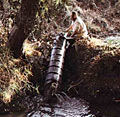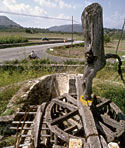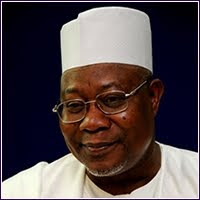Posted on Sunday 3 January 2010
An already difficult situation for Democrats in Congress is worsening as the 2010 political season opens. To minimize expected losses in next fall’s election, President Barack Obama’s party is testing a line of attack that resurrects George W. Bush as a boogeyman and cast
It’s not a bad idea. But it would have been a little bit more believable if the Democrats hadn’t spent the last year scrupulously "looking forward not backward" and coddling Wall Street and the banksters. George W. Bush is a ghost now and his VP has reanimated himself as a national security monster whose every utterance seems to force the President into ever more hawkish postures. And unlike Bush, Obama failed to use the term "mah predecessor" every five minutes and the Democrats didn’t bother to evoke him as the cause of everything evil in the world, so Bush is now a receding nightmare you’re happy to forget. It always seemed like a bad idea to me not to keep him front and center.As for the cozy with Wall Street thing, well, it’s worth a try. It might have been better to have worked that angle aggressively right out of the box, tie the recession into Republican deregulation, strongly endorse serious financial market reform and aggressively take on Wall Street’s insane incentives and pay structure, but I suppose it’s better late than never. At this point, unfortunately, I’m just not sure if anyone will believe it.
Still, I like it. And anyway, what else can they do?
Update:This should help, although the Republicans will undoubtedly find a way to blame it on the Democrats:
The past decade was the worst for the U.S. economy in modern times, a sharp reversal from a long period of prosperity that is leading economists and policymakers to fundamentally rethink the underpinnings of the nation’s growth. It was, according to a wide range of data, a lost decade for American workers. The decade began in a moment of triumphalism — there was a current of thought among economists in 1999 that recessions were a thing of the past. By the end, there were two, bookends to a debt-driven expansion that was neither robust nor sustainable. There has been zero net job creation since December 1999. No previous decade going back to the 1940s had job growth of less than 20 percent. Economic output rose at its slowest rate of any decade since the 1930s as well. Middle-income households made less in 2008, when adjusted for inflation, than they did in 1999 — and the number is sure to have declined further during a difficult 2009. The Aughts were the first decade of falling median incomes since figures were first compiled in the 1960s.
And the net worth of American households — the value of their houses, retirement funds and other assets minus debts — has also declined when adjusted for inflation, compared with sharp gains in every previous decade since data were initially collected in the 1950s. "This was the first business cycle where a working-age household ended up worse at the end of it than the beginning, and this in spite of substantial growth in productivity, which should have been able to improve everyone’s well-being," said Lawrence Mishel, president of the Economic Policy Institute, a liberal think tank.


![Russian Missles in Cuba [1962] Russian Missles in Cuba [1962]](http://www.swatbiggame.com/resources/_wsb_507x367_cuban+missles5.jpg)

 On 9/11, they sent groups onto the planes. That worked. They had surprise on their side, and the solidarity of the terrorist group working for them. Umar Farouk Abdul Mutallab was all alone. He bungled assembling his bomb and seemed in a fog as he was restrained – showing nothing even though he was sustaining severe burns. I’m proposing that though he may have been a terrorist, he was also terrorized himself. There was no group support, no experience in the fog of war. I think his denial mechanisms must’ve broken down and he was paralyzed, dazed – he may have even had a vision of the reality of what he was doing.
On 9/11, they sent groups onto the planes. That worked. They had surprise on their side, and the solidarity of the terrorist group working for them. Umar Farouk Abdul Mutallab was all alone. He bungled assembling his bomb and seemed in a fog as he was restrained – showing nothing even though he was sustaining severe burns. I’m proposing that though he may have been a terrorist, he was also terrorized himself. There was no group support, no experience in the fog of war. I think his denial mechanisms must’ve broken down and he was paralyzed, dazed – he may have even had a vision of the reality of what he was doing.



 So, how does the water get from the Nile to the ditches? It’s not very far [depending on the season].
So, how does the water get from the Nile to the ditches? It’s not very far [depending on the season].  There are three ancient methods, all of which remain in widespread use. The simplest is the shaduf, a counter-weighted lever bucket apparatus. Dip the bucket in, lift it out, spin it to the ditch, then dump it. Repeat for centuries. There are smaller versions that can be operated with one hand [by a mother holding a child].
There are three ancient methods, all of which remain in widespread use. The simplest is the shaduf, a counter-weighted lever bucket apparatus. Dip the bucket in, lift it out, spin it to the ditch, then dump it. Repeat for centuries. There are smaller versions that can be operated with one hand [by a mother holding a child].  Another method is the Archimedes Screw, which is operated by a hand crank. It’s more labor intensive, but moves more water. But if you’ve got a large field, you need a water buffalo to turn your Saqiya with its wooden gears and water wheel.
Another method is the Archimedes Screw, which is operated by a hand crank. It’s more labor intensive, but moves more water. But if you’ve got a large field, you need a water buffalo to turn your Saqiya with its wooden gears and water wheel.  Floating down the Nile, all of these primitive methods of moving water from the Nile into the Irrigation Ditches were in use. In fact, if there were other methods, like pumps, I didn’t see them anywhere. What our guide said was that there were some places where more modern pumps were in use because there was no other choice, but that the old methods were always used as the first line. It wasn’t because they didn’t have electric pumps or electricity. It was because they didn’t want to put people out of work. At first, I was suspicious of this answer, thinking it might be a way of denying the poverty in much of Egypt. But as we continued up the Nile, I became convinced. It was only one of several examples of this concept that seemed foreign to our American way of thinking.
Floating down the Nile, all of these primitive methods of moving water from the Nile into the Irrigation Ditches were in use. In fact, if there were other methods, like pumps, I didn’t see them anywhere. What our guide said was that there were some places where more modern pumps were in use because there was no other choice, but that the old methods were always used as the first line. It wasn’t because they didn’t have electric pumps or electricity. It was because they didn’t want to put people out of work. At first, I was suspicious of this answer, thinking it might be a way of denying the poverty in much of Egypt. But as we continued up the Nile, I became convinced. It was only one of several examples of this concept that seemed foreign to our American way of thinking. 
 On our trip through Egypt and Jordan, we were almost daily told something or another about Islam – usually with the assumption that all of us [130 people] were Christians – a universal assumption made when we’ve traveled. And what we were told about Muslims mirrored what’s written here in the Washington Post. If Terrorism was mentioned, they were called "extremists." In a public school in Egypt, we saw a book about how terrorism wasn’t part of Islam – the guide said, "You have to teach them early."
On our trip through Egypt and Jordan, we were almost daily told something or another about Islam – usually with the assumption that all of us [130 people] were Christians – a universal assumption made when we’ve traveled. And what we were told about Muslims mirrored what’s written here in the Washington Post. If Terrorism was mentioned, they were called "extremists." In a public school in Egypt, we saw a book about how terrorism wasn’t part of Islam – the guide said, "You have to teach them early." I accept that right-thinking Muslims cannot stop al Qaeda, that right-thinking Christians cannot quell the excesses of the Religious Right, that right-thinking Jews cannot quell the excesses of the Zionists, but they can do better than ignoring or disavowing. They can say, "I am ashamed of what was done in the name of Allah, Mohamed, Jesus, God, Yaweh. And they can talk to their "brothers" in faith endlessly about what’s hapenning. The courageous Nigerian who turned in his own radicalized son is my kind of Muslim and an example for us all…
I accept that right-thinking Muslims cannot stop al Qaeda, that right-thinking Christians cannot quell the excesses of the Religious Right, that right-thinking Jews cannot quell the excesses of the Zionists, but they can do better than ignoring or disavowing. They can say, "I am ashamed of what was done in the name of Allah, Mohamed, Jesus, God, Yaweh. And they can talk to their "brothers" in faith endlessly about what’s hapenning. The courageous Nigerian who turned in his own radicalized son is my kind of Muslim and an example for us all… Mir Hossein Mousavi, the Iranian opposition leader, has called for an immediate end to the government crackdown on opposition activists, saying he was ready to die in defence of people’s rights. In a statement on his Kaleme website on Friday, Mousavi also said that the Islamic Republic was in "serious crisis" following the disputed presidential election in June. "I am not afraid to die for people’s demands … Iran is in serious crisis … Harsh remarks … will create internal uprising … the election law should be changed … political prisoners should be freed," his statement added.
Mir Hossein Mousavi, the Iranian opposition leader, has called for an immediate end to the government crackdown on opposition activists, saying he was ready to die in defence of people’s rights. In a statement on his Kaleme website on Friday, Mousavi also said that the Islamic Republic was in "serious crisis" following the disputed presidential election in June. "I am not afraid to die for people’s demands … Iran is in serious crisis … Harsh remarks … will create internal uprising … the election law should be changed … political prisoners should be freed," his statement added.